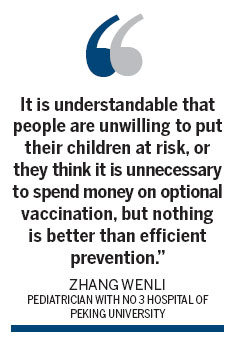Knowing vaccines
"There are no statistics, but optional vaccination is much less popular with parents," says Zhang Weina, a vaccination specialist with Beijing Tongren Hospital.
In areas where medical authorities promote the benefits of vaccines, the inoculation rate of optional vaccines is much higher than areas where there is less effort to educate people about vaccines, Zhang notes.
Better economic conditions also contribute to higher inoculation rates, and vice versa, Zhang adds.

Zhao Lu'na, a migrant worker in Beijing and mother to a 6-year-old son, admits that optional immunization is too expensive. She and her husband make only a few thousand yuan per month, but optional vaccines can cost from about 100 ($16.20) to nearly 1,000 yuan.
"I believe vaccination protects the child, but we cannot afford optional vaccines," Zhao says.
In her neighborhood, where there are mainly migrant residents, most children do not get the extra inoculations because people think they cost too much and they are not a necessity, Zhao adds.
Even when money is not a problem, many parents choose not to get optional vaccination because they are fearful of health risks and undesirable results.
"I have no choice with the mandatory vaccinations because it is government regulations. But I will not let my child get any optional inoculation," says Bian Jianling, a Beijinger with a 6-year-old daughter. "No one can be 100 percent sure that the vaccines are completely safe."
In the eyes of Bian and those who question the safety and necessity of optional vaccinations, their concerns are not groundless. There have been occasions when they have been alarmed by news headlines about children who developed severe side effects after getting vaccinated, with some paralyzed or even killed.
Related:
















